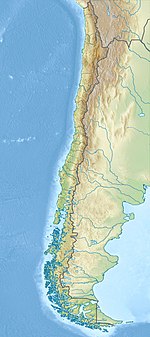Tralcán Formation (Spanish: Formación Tralcán) is a sedimentary formation of Triassic age in Los Ríos Region in south–central Chile. It overlies unconformably the Trafún Metamorphic Complex. Tralcán Formation and nearby Panguipulli Formation form possibly the remnants of an ancient lake and river system. The formation is named after Mount Tralcán on the western edge of Riñihue Lake.[1]
| Tralcán Formation | |
|---|---|
| Stratigraphic range: Rhaetian | |
| Type | Geological formation |
| Underlies | Quaternary glacial deposits |
| Overlies | Trafún Metamorphic Complex |
| Thickness | >800 m (2,600 ft) |
| Lithology | |
| Primary | Conglomerate, sandstone, mudstone |
| Other | Shale |
| Location | |
| Coordinates | 39°48′S 72°30′W / 39.8°S 72.5°W |
| Region | Los Ríos Region |
| Country | |
| Type section | |
| Named for | Tralcán |
| Named by | Aguirre & Levi |
| Year defined | 1964 |
Description
editThe Tralcán Formation was first defined by Aguirre and Levi in 1964, based on the outcrop at Tralcán. The more than 800 metres (2,600 ft)[1] thick formation comprises reddish-grey conglomerates with a sandy matrix and intercalated reddish shales. The shales of the formation contain abundant fossil flora. Fossils of Cladophlebistenia oeshi have helped to redefine the age of the formation, that was formerly considered Late Jurassic (Kimmeridgian to Tithonian), to the Rhaetian of the Triassic.[2]
Fossil content
editThe following genera of fossil flora have been identified in the formation:[1]
References
editBibliography
edit- Di Biase F., Francisco; Lillo R., Fernanda (1973), Geología Regional, Geoquímica de Drenaje y Minería de la Provincia de Valdivia (PDF), Instituto de Investigación de Recursos Naturales, pp. 1–101, retrieved 2019-02-21
- Herbst, Rafael; Troncoso, Alejandro; Muñoz, Jorge (2005), "Las tafofloras triásicas de la región de los Lagos, Xma Región, Chile", Ameghiniana (in Spanish), 42 (2), retrieved 2019-02-21
